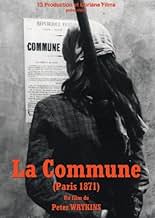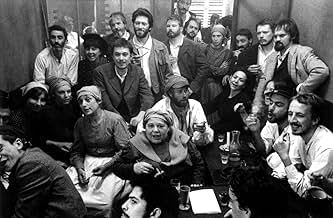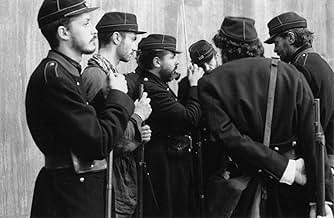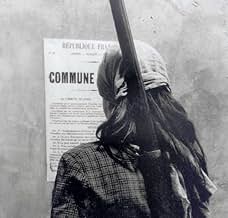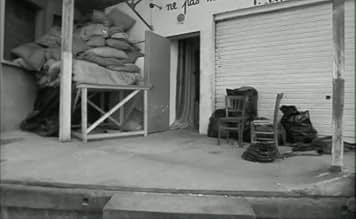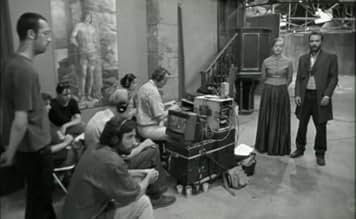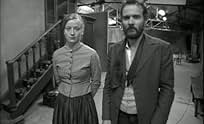La commune (Paris, 1871)
- 2000
- 5h 45m
IMDb RATING
8.0/10
1.4K
YOUR RATING
In this war drama blurring the lines between documentary and fiction, the working class and the bourgeoisie of 19th century Paris are interviewed and covered on television, before and during... Read allIn this war drama blurring the lines between documentary and fiction, the working class and the bourgeoisie of 19th century Paris are interviewed and covered on television, before and during a tragic workers' class revolt.In this war drama blurring the lines between documentary and fiction, the working class and the bourgeoisie of 19th century Paris are interviewed and covered on television, before and during a tragic workers' class revolt.
- Director
- Writers
- Stars
- Awards
- 1 win & 1 nomination total
- Director
- Writers
- All cast & crew
- Production, box office & more at IMDbPro
Featured reviews
Peter Watkins stands at the base of a form of historical documentaries known as 'documentary reconstruction'. Lightly based on battle re-enactments, Watkins hires amateur actors to play the roles of common people in the Paris of 1871. Famine and civil unrest cause a popular revolution, supported by followers of Karl Marx. The people take power and form a Commune, a communist government. After a few weeks, the official Versailles government regains the city by force, and tens of thousands of people are executed.
Watkins' historical drama is based on the common people, which are shown in their everyday life. To do this, he introduced an anachronism: in the 1871 context, the people form a tv station. The Versaillais also have their official tv station. This way, the documentary becomes both a social project and a media experiment.
Watkins' historical drama is based on the common people, which are shown in their everyday life. To do this, he introduced an anachronism: in the 1871 context, the people form a tv station. The Versaillais also have their official tv station. This way, the documentary becomes both a social project and a media experiment.
Peter Watkins' nearly 6-hour long docudrama, "La Commune (Paris, 1871)," is a surprisingly passionate and fast-moving lesson in history. It is also a brilliant demonstration of how history is shaped, and re-shaped, by the tellers of the tale.
Using the "You Are There" approach of earlier radio and TV days, Watkins has a male and female news team from "Commune TV" wandering through the poorest district of Paris inviting people to express their grievances against the state to the camera.
While the people bitterly suffer because of the government's inept defeat at the hands of the Germans during the Franco-Prussian War, their anger inspires solidarity for them throughout Paris, and although they briefly rise up and seize power, they are brutally put down in the end.
Ironically, during the course of their uprising, a TV monitor in the background features happy-talk "Versailles TV" news anchors, who continually vilify the Communards and rationalize the government's brutal acts of supression.
"La Commune" is a must-see for students of history, and a must-see for students of the media.
Using the "You Are There" approach of earlier radio and TV days, Watkins has a male and female news team from "Commune TV" wandering through the poorest district of Paris inviting people to express their grievances against the state to the camera.
While the people bitterly suffer because of the government's inept defeat at the hands of the Germans during the Franco-Prussian War, their anger inspires solidarity for them throughout Paris, and although they briefly rise up and seize power, they are brutally put down in the end.
Ironically, during the course of their uprising, a TV monitor in the background features happy-talk "Versailles TV" news anchors, who continually vilify the Communards and rationalize the government's brutal acts of supression.
"La Commune" is a must-see for students of history, and a must-see for students of the media.
Peter Watkins' nearly 6-hour long docudrama, "La Commune (Paris, 1871), is a surprisingly passionate and fast-moving lesson in history. It is also a brilliant demonstration of how history is shaped, and re-shaped, by the tellers of the tale.
Using the "You Are There" approach of earlier radio and TV days, Watkins has a male and female news team from "Commune TV" wandering through the poorest district of Paris inviting people to express their grievances against the state to the camera.
While the people bitterly suffer because of the government's inept defeat at the hands of the Germans during the Franco-Prussian War, their anger inspires solidarity for them throughout Paris, and although they briefly rise up and seize power, they are brutally put down in the end.
Ironically, during the course of their uprising, a TV monitor in the background features happy-talk "Versailles TV" news anchors, who continually vilify the Communards and rationalize the government's brutal acts of suppression.
"La Commune (Paris, 1871)" is a must-see for students of history, and a must-see for students of the media.
Using the "You Are There" approach of earlier radio and TV days, Watkins has a male and female news team from "Commune TV" wandering through the poorest district of Paris inviting people to express their grievances against the state to the camera.
While the people bitterly suffer because of the government's inept defeat at the hands of the Germans during the Franco-Prussian War, their anger inspires solidarity for them throughout Paris, and although they briefly rise up and seize power, they are brutally put down in the end.
Ironically, during the course of their uprising, a TV monitor in the background features happy-talk "Versailles TV" news anchors, who continually vilify the Communards and rationalize the government's brutal acts of suppression.
"La Commune (Paris, 1871)" is a must-see for students of history, and a must-see for students of the media.
I must admit, the first thing that caught my attention in the programme of Arsenal Movie Theatre was the length of the film - 345 min. I was intrigued and looked it up on the internet, starting with imdb, and became even more intrigued. So I saw the movie yesterday.
And I didn't regret it at all. (Although I had to struggle through German subtitles for the shorter German version of 300 min. The announced full one with English subtitles was stuck somewhere in Paris.)
It is probably one of the most unusual movies I've ever seen. It is even not really a movie, at least in the standard understanding of it (let alone the length of the thing). It is obviously a mind game, but a mind game so fine and intellectual, as well as passionate, thrilling and challenging, that it somehow makes you feel deeply involved in it emotionally, not forgetting for a single moment that it is a game and the whole idea is completely absurd.
Indeed, what can be more absurd than watching "breaking news" about Paris Commune of 1871, like we were all watching tv on 9.11 or when the war in Iraq was about to begin. "Versailles TV", "Commune TV". Journalists asking "What do you feel now? What hopes do you have now for the future of The Commune?". But all staged, actors sometimes telling the camera about the roles they are playing. Or discussing whether The Commune could have had future, or Russian revolution was successful despite Kronstadt uprising.
The shocking thing is that it feels real. Even though you perfectly understand that it can't. He's using the media and our perception of the media (which makes us question to what an extent can our senses be manipulated) as a frame for all the events happening and in a way alters our perception of history and of history happening now.
I'm still digesting the movie, it raises a lot of question and makes you think a lot. But I'm happy to know that Arsenal is planning Peter Watkins's retrospective. So Berliners will have a unique chance to see his other works. Which I'm looking forward to.
And I didn't regret it at all. (Although I had to struggle through German subtitles for the shorter German version of 300 min. The announced full one with English subtitles was stuck somewhere in Paris.)
It is probably one of the most unusual movies I've ever seen. It is even not really a movie, at least in the standard understanding of it (let alone the length of the thing). It is obviously a mind game, but a mind game so fine and intellectual, as well as passionate, thrilling and challenging, that it somehow makes you feel deeply involved in it emotionally, not forgetting for a single moment that it is a game and the whole idea is completely absurd.
Indeed, what can be more absurd than watching "breaking news" about Paris Commune of 1871, like we were all watching tv on 9.11 or when the war in Iraq was about to begin. "Versailles TV", "Commune TV". Journalists asking "What do you feel now? What hopes do you have now for the future of The Commune?". But all staged, actors sometimes telling the camera about the roles they are playing. Or discussing whether The Commune could have had future, or Russian revolution was successful despite Kronstadt uprising.
The shocking thing is that it feels real. Even though you perfectly understand that it can't. He's using the media and our perception of the media (which makes us question to what an extent can our senses be manipulated) as a frame for all the events happening and in a way alters our perception of history and of history happening now.
I'm still digesting the movie, it raises a lot of question and makes you think a lot. But I'm happy to know that Arsenal is planning Peter Watkins's retrospective. So Berliners will have a unique chance to see his other works. Which I'm looking forward to.
Truly exceptional film making really breaking down the barriers of what is storytelling and letting everything run free. Peter Watkins does what would seem the impossible, not only create a realistic re-enactment of the commune in Paris (just after the siege of the Prussians and the exile of the bourgeois to Versailles) using only an abandoned warehouse and 200 odd unemployed French citizens and illegal immigrants but also to on top of that add a detailed and amazing social experiment. Putting these people through this experience and then have them portray not only their 1871 characters but also themselves in the one film. To hear these people talk about life today and draw parallels between the film they are making and the lives they lead is quite invaluable information. And as if that alone wasn't enough there is the whole other element of the media and how sides are formed and why people believe what they do and how things are taught and passed down so that divides never seem to cease. The use of reporting and television and newspapers really give this film a whole other level from which to operate and constantly throughout the film one has to ask themselves "who do I believe, do I believe anyone" "why am i believing what this person says and not this person" then as if one hasn't had enough thinking to do already you then, like the cast, have to project forward to today and ask yourself who do i believe when it comes to the reporting of current events? Am I receiving an accurate picture of what is occurring? I don't think anyone who offers themselves up to this 6 hour masterpiece can look at the media in quite the same way. Once again I just have to say this film is without a doubt set to become a masterpiece to filmmaking and I urge anyone who happens to see it on a program for a festival or perhaps even on television to sacrifice those few hours, you wont be disappointed. Also is you are left in awe after its viewing as I was then look out for the Universal Clock- The Resistance of Peter Watkins, it acts as a sort of "making of" but is a film in its own right and gives insight to what it was like to be involved in the making of Le Commune Paris 1871
Did you know
- Alternate versionsIn December 2002 Peter Watkins started the editing of an abridged theatrical version. In a prologue he expresses his views on discovering that the production company, 13 Production, has financial links with the Lagardère Group (which sells Military Weapons through Matra), then he warns the audience about how much of the sequence shots and live debates from the original full-length movie have been lost in the process of reducing the running time by more than 2 hours to 3 hrs 1/2.
- ConnectionsFeatured in L'Horloge universelle : la résistance de Peter Watkins (2001)
- How long is La Commune (Paris, 1871)?Powered by Alexa
Details
- Release date
- Country of origin
- Languages
- Also known as
- La Commune (Paris, 1871)
- Production companies
- See more company credits at IMDbPro
Box office
- Gross US & Canada
- $5,340
- Opening weekend US & Canada
- $2,930
- Jul 6, 2003
- Gross worldwide
- $21,641
- Runtime
- 5h 45m(345 min)
- Color
- Sound mix
- Aspect ratio
- 1.66 : 1
Contribute to this page
Suggest an edit or add missing content


